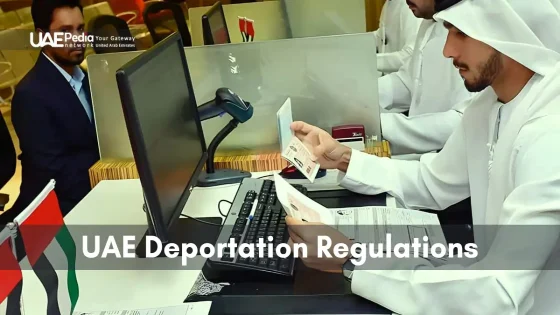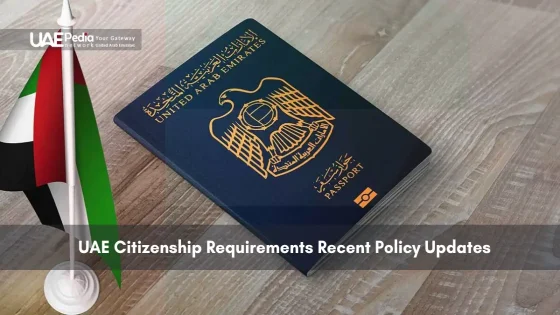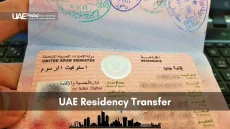UAE deportation laws are very strict. They can change a person’s life a lot. What makes someone get deported in the UAE? The line between being allowed to stay and getting kicked out is very thin.
The UAE has a strict law for foreigners. It’s called Federal Law by Decree No. (29) of 2021. This law says who can enter and live in the UAE. It also says that if someone gets deported, their family might get deported too. This shows how serious it is to break UAE immigration rules.
It’s very important for people living in the Emirates to know these laws.
There are two ways: through the courts or by the government. If someone is found guilty of a big crime, they might get deported by the courts. The government can deport someone if they break the rules.
The UAE wants to keep everyone safe. They use the Penal Code to make sure of it. Article 121 of Law No. 3 of 1987 (as amended) lists reasons for deportation. This shows the UAE’s strong commitment to safety and following the rules.
Types of Deportation in the UAE Legal Framework
The UAE has rules for deporting people. There are two main types: judicial and administrative. These rules help keep the country safe and stable.
Judicial Deportation and Court Orders
Judicial deportation happens when a court says someone must leave. This is for serious crimes that take away freedom. It also includes some sexual assault cases.
For smaller crimes, the court can decide if someone should leave.
Administrative Deportation Process
Administrative deportation is done by the Federal Identity and Citizenship Authority. It’s to protect the public, security, and morals. You can appeal this decision to the General Directorate of Residency and Foreigners’ Affairs.
Grace Periods and Settlement Rights
The UAE gives a grace period for deportation. This lets people up to three months to sort things out. The Federal Authority for Identity and Citizenship decides this time.
During this time, you can:
- Liquidating business interests
- Resolving pending legal matters
- Arranging personal affairs
| Type of Deportation | Issuing Authority | Grounds |
|---|---|---|
| Judicial | Courts | Felonies, specific crimes |
| Administrative | Federal Identity and Citizenship Authority | Public interest, security, morals |
It’s key for foreigners in the UAE to know about deportation. A deported person can only come back with special permission from the Director General of the Federal Authority for Identity and Citizenship.
UAE Deportation Regulations and Legal Procedures
The UAE has strict rules for deporting people. The Federal Identity and Citizenship Authority UAE oversees these rules. They manage deportations and give grace periods to those who must leave.
Role of Federal Identity and Citizenship Authority
The Federal Identity and Citizenship Authority UAE deals with deportation cases. They can give up to three months to sort out personal issues before leaving. They also handle permits for coming back after deportation.
Special Permits and Re-entry Requirements
To come back after deportation, you need a special permit. The Director General of the Federal Identity and Citizenship Authority must approve it. You must tell them about your past, why you were deported, and any changes in your life.
Legal Rights During Deportation Proceedings
You have rights when facing deportation in the UAE. You can appeal, have time to settle things, and apply for re-entry permits. You can appeal through public prosecution, where you explain your side and provide documents.
| Deportation Type | Issuing Authority | Basis |
|---|---|---|
| Judicial | Court | Serious crimes or public order offenses |
| Administrative | ICP | Public interest, security, or moral concerns |
These steps make sure the UAE follows fair rules. They balance keeping the country safe with protecting people’s rights.
Understanding UAE Blacklist and Administrative Lists
The UAE has a system of blacklists and administrative lists. These lists help control who can enter or leave the country. The UAE blacklist is for people banned from entering or leaving due to criminal acts or security issues.
Administrative lists UAE deal with living and working in the UAE. They include workers who left early and people who ran away from their sponsors. Knowing about these lists helps you understand UAE’s immigration rules, especially for entry or exit bans.
Getting off these lists has its own rules. Court bans need a court order to be lifted. Administrative bans can be removed after a year, under certain conditions. The Federal Department of Criminal Police handles the blacklist. The General Directorate of Residency and Foreigners’ Affairs looks after administrative lists.
| List Type | Managed By | Removal Process |
|---|---|---|
| UAE Blacklist | Federal Department of Criminal Police | Court directive required |
| Administrative Lists | General Directorate of Residency and Foreigners’ Affairs | Possible after one year under certain conditions |
If you’re facing entry or exit restrictions, knowing how to lift a deportation ban UAE is key. People deported for crimes might not come back, but they can ask for special permits. Those deported for visa issues might come back after one to five years.
Conclusion
It’s very important for people living or visiting the UAE to know about deportation laws. The UAE has two kinds of deportation: judicial and administrative. Judicial deportation is for those who have been found guilty of serious crimes.
Administrative deportation is for public safety and moral reasons. This is based on a law from 1997.
Being deported from the UAE can really hurt your future there. You might not be able to come back or work. People who are deported get up to three months to sort out their things.
Those deported for crimes in the UAE are also banned in other Gulf countries. This makes it even harder for them to move around.
The UAE’s immigration rules are strict but you can appeal. If you were deported for administrative reasons, you can ask the Public Prosecution to remove it. Getting legal help is very important.
Legal experts can help with criminal defense, immigration, and work issues. They can help you understand and follow UAE’s laws better.



















